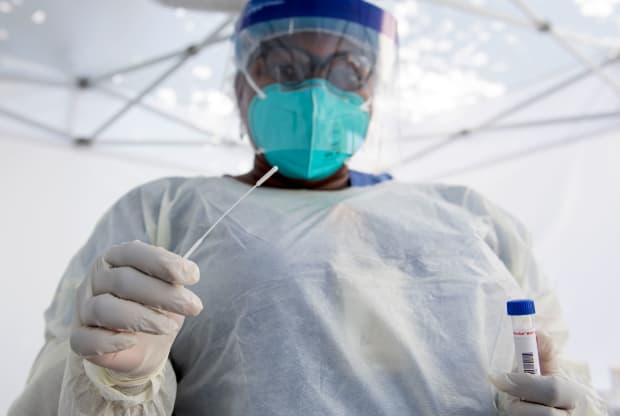# ‘The hope is these barriers to testing decline’: COVID-19 test turnaround time still lags — especially for many people of color

Table of Contents
“#
‘The hope is these barriers to testing decline’: COVID-19 test turnaround time still lags — especially for many people of color
”
‘Test results are [still] too slow in most cases to support a successful strategy of contact tracing’

‘The hope is these barriers to testing decline and wait times go down — crucial steps especially as we head into winter.’
Valerie Macon/AFP via Getty Images
Coronavirus testing turnaround time has improved since the early months of the pandemic, according to a new report, but it still isn’t fast enough — and racial disparities in testing persist.
The average wait time for receiving COVID-19 test results dropped from 4.0 days in April to 2.7 days in September, according to the analysis of national survey data by researchers at Northeastern University, Harvard University, Rutgers University and Northwestern University.
“This suggests that contact tracing is not as ideal as it could be, and the lack of tracing is surely contributing to the spread,” report co-author James Druckman, a political scientist at Northwestern, said in a news release. “The hope is these barriers to testing decline and wait times go down — crucial steps especially as we head into winter.”
Contact-tracing entities included state governments (37% of respondents who were contacted), local governments (28%), hospitals (25%) and nonprofit groups (8%).
The researchers, who have collected coronavirus survey data since April, drew from three waves of survey results from 52,329 respondents in all 50 states and Washington, D.C., in July, August and September, 12,911 of whom had been tested. Some 8,843 respondents, the basis for this analysis, had exclusively received COVID-19 nasal-swab tests.
“
Of the 8% of respondents reporting in September that they had wanted to get tested but couldn’t, reasons included not knowing how or where to get tested, too-long wait times, being told by doctors that a test wasn’t needed, the distance of the testing site and the cost of the test.
”
Black and Hispanic respondents to the three survey waves said they had experienced worse delays in test-result turnaround. Black and Hispanic respondents waited 4.4 days and 4.1 days on average for their test results, respectively, compared to white respondents’ 3.5 days and Asian Americans’ 3.6 days, according to the survey.
A previous report by the same research group in August also found racial disparities in test-result wait time. Black and Latino people have made up a disproportionate share of COVID-19 illness and death in the United States.
Results aside, some survey respondents faced hurdles to actually gaining access to testing. More than a third in August and September reported waiting at least three days between the time they decided to get tested and the date of their test, the survey found, with the average test recipient in August and September waiting a total of 6.2 days from their initial decision to seek testing to receipt of their test results.
Respondents who were Black (7.4 days), Hispanic (6.9 days) and Asian American (6.1 days) faced a longer window from start to finish than white respondents (5.7 days).
Of the 8% of respondents reporting in September that they had wanted to get tested but couldn’t, reasons included not knowing how or where to get tested (31%), too-long wait times (29%), being told by doctors that a test wasn’t needed (29%), the distance of the testing site (23%) and the cost of the test (14%).
The Centers for Medicare and Medicaid Services said Thursday that starting next year, they would reduce Medicare payments by $25 per test for labs taking more than two days to process COVID-19 tests.
Effective Jan. 1, Medicare will pay $100 per test “only to laboratories that complete high throughput COVID-19 diagnostic tests within two calendar days of the specimen being collected,” the agency said; labs that take longer than two days will receive $75 per test from Medicare.
“As America continues to grapple with the COVID-19 pandemic, prompt testing turnaround times are more important than ever,” CMS administrator Seema Verma said in a statement. The faster testing “will allow patients and physicians to act quickly and decisively with respect to treatment decisions, physical isolation, and contact tracing,” she added.
The president of the American Clinical Laboratory Association, a trade group representing laboratories, responded in a statement that the association was “concerned this policy could create a domino effect where patient access to testing is severely reduced.”
“Cutting laboratory reimbursement won’t address the root causes of delayed turnaround times,” ACLA president Julie Khani said. “Turnaround time is driven largely by fluctuations in demand and access to critical supplies. As states across the country experience a surge in new cases, the global demand for testing supplies remains high.”
By
Meera Jagannathan
For forums sites go to Forum.BuradaBiliyorum.Com
If you want to read more News articles, you can visit our News category.



